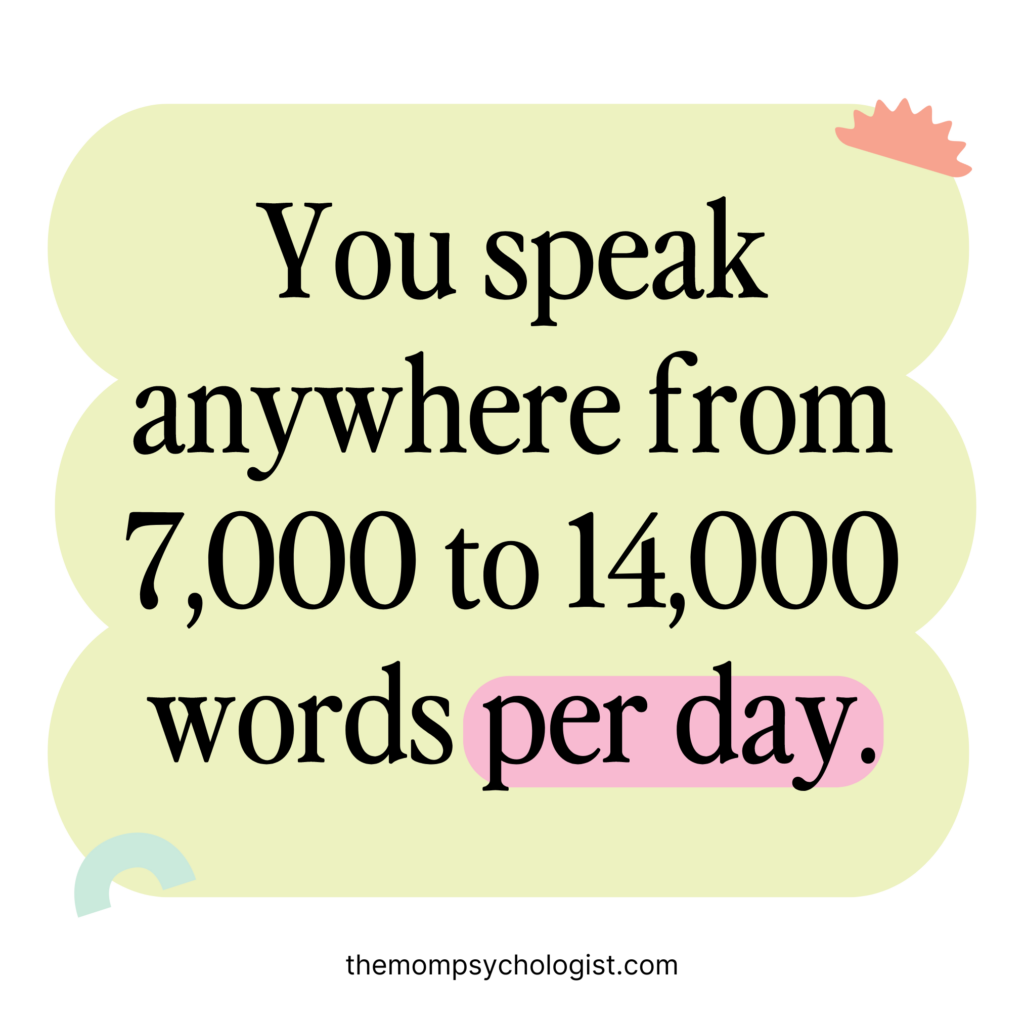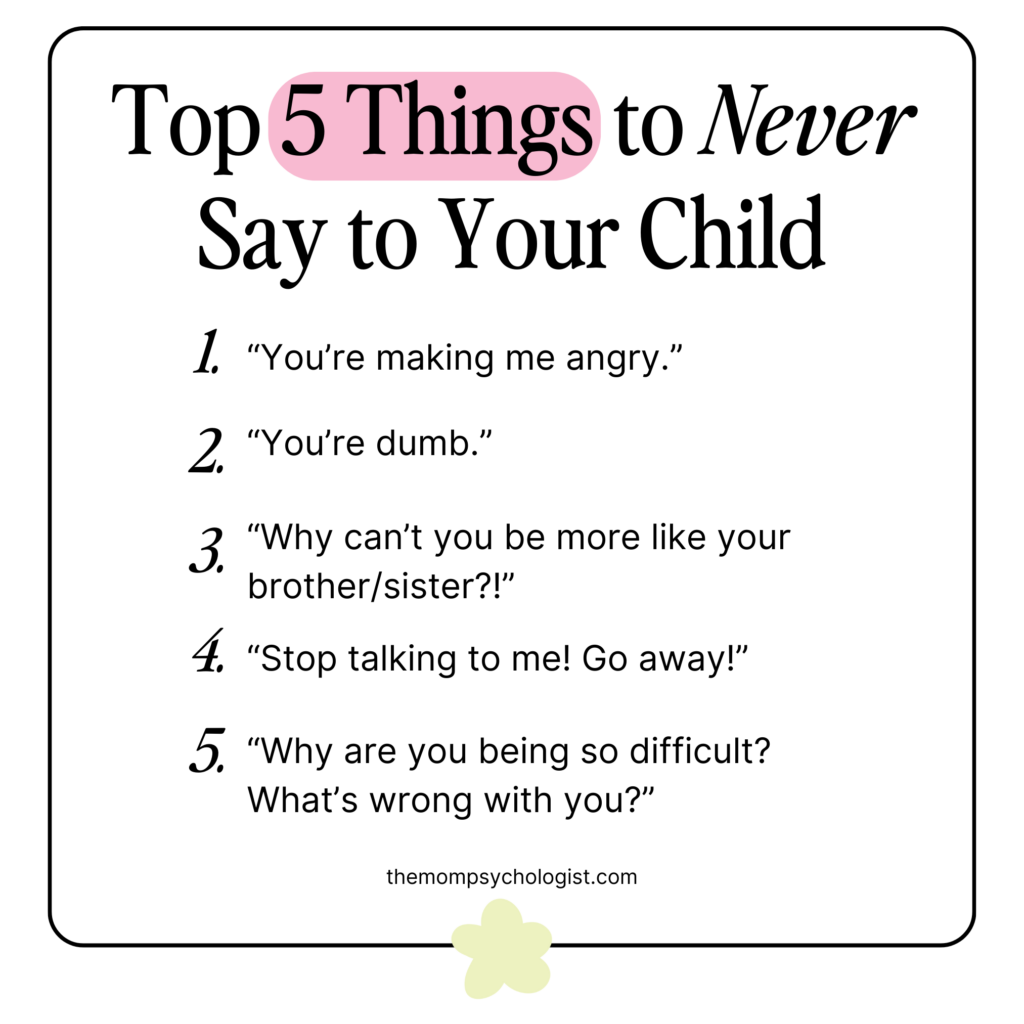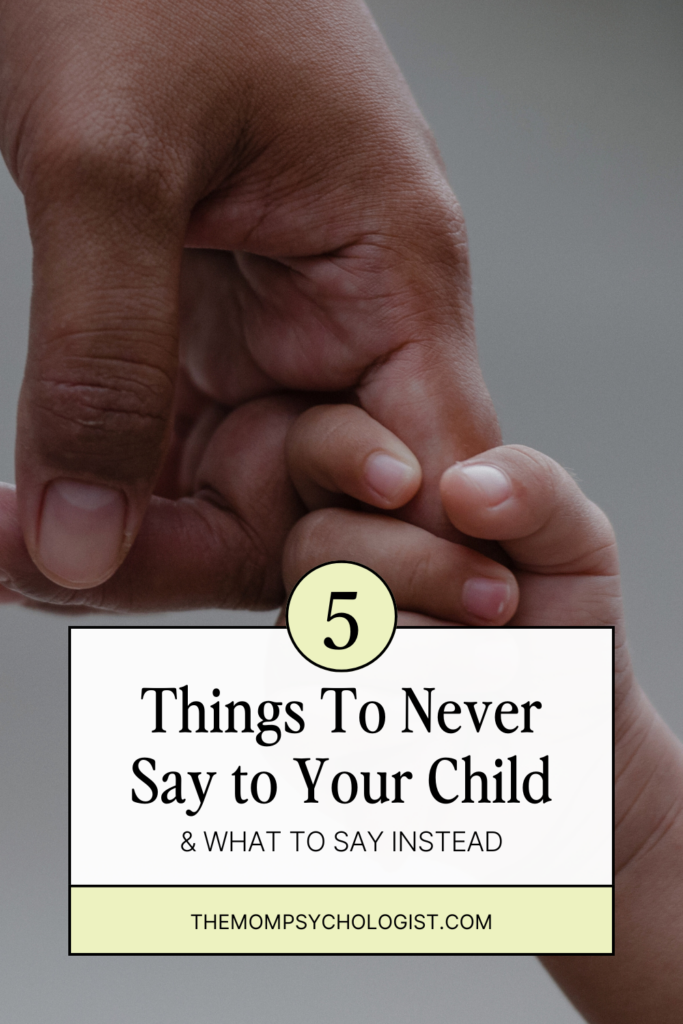watch now!
A place where I discuss all things related to toddlers and motherhood!
Subscribe to my Youtube channel
As a clinical psychologist, published author, and mother to two cheeky young children, I get it. I’ve spent YEARS researching and filtering through the noise online, so you don’t have to.
PARENTING TIPS
POTTY TRAINING
ANTIRACISM
PLAY
Blog Topics
SIBLING RIVALRY
SCREEN TIME
TANTRUMS
DISCIPLINE
Hi I'm Dr. Jazmine
Top 5 Things to Never Say to Your Child
topics:
RATHER LISTEN? HERE’S A LINK TO THE EPISODE ON MY PODCAST.
You speak anywhere from 7,000 to 14,000 words a day.
In the vast sea of so many words, there are certain words and phrases that stick out in the human mind – those which are said out of anger.
There are just certain things you don’t say as parents. As adults, we carry a lot of power especially through our words.
They have the ability to either build our children up or tear them down. To connect or push our kids away. To breed self-confidence and self-love or self-doubt and shame.

So in this letter, I’m shooting it to you straight.
I’m going to share the top 5 things to avoid saying to your child and why.
Avoid these phrases like the plague. Just don’t say them. You can never take back what you said out of anger and children don’t forget them.
Phrase 1: “You’re making me angry!”
No one “makes” you angry. Yes, their behaviors influence your thoughts and feelings but your child is not to blame for your anger and what you do out of anger.
Making someone else responsible for your feelings is a subtle form of manipulation. It’s a way of saying, “I feel powerless and that makes me angry. I want you to do what I say so I’m going to try to make you feel scared and guilty so you’ll submit to me.”
This dynamic leads to deep disconnection in the parent-child relationship. It also causes your child to experience fear which causes one of 3 responses:
- Fight – You’ll either initiate a power struggle (a fight for power and control) and your child will become defensive and angry.
- Flee – Your child will either retreat and avoid you.
- Freeze – They’ll become numb, frozen in fear and won’t respond at all.
During periods of stress, our bodies do one of these three things to protect ourselves. As parents we want to be very cautious of being the source of fear.

It’s a very scary place for a child to know you are angry and feel to blame for your feelings of intense anger.
Another thing to remember is that whenever we blame others for how we feel we immediately give our power away. Now it’s on them to “fix us” and that’s impossible. Anger is an inside job. And if we make others to blame, we avoid taking accountability for changing our life and our mindset.
So, instead try something like…
“We’re having a hard moment right now. I’m noticing that I’m starting to feel angry right now. It’s my job to calm my body down…”
Modeling how to label emotions and the ways you manage your feelings teaches emotional regulation and builds trust.
Always remember: Children are not responsible for calming adults down.
It’s our job to be the calm and mature person in the relationship, not theirs.
2. “You’re dumb.”
The ways in which we speak to our kids becomes their inner voice. If we tell them that they are stupid, or any other critical statement, they will believe us.
Criticism can come in various forms. There’s the more blatant form of criticism that sounds like a put down (e.g., “You’re so careless.”, “Stop being so stupid.”, “Quit being so annoying.”) and then there’s more subtle forms that are disguised as jokes and sarcasm meant to correct behavior.
Research tells us children of critical parents are more likely to use avoidant coping skills (e.g., procrastination, rumination, being passive-aggressive) and even avoid others’ emotional facial expressions, both positive and negative. This can negatively impact their relationships, limiting their capacity to read and understand social cues and the emotional world of others. When children are exposed to chronic criticism from their parents and caregivers, they come to expect this type of treatment from others.
When children get it “wrong,” focus on problem solving (not wallowing in negativity). As my mom always said, “If you’re not a part of the solution, you are a part of the problem.” This phrase always rings in my mind whenever I encounter issues with my children. It reminds me that:
- Most issues are fixable.
- It’s my responsibility as the parent to lead my child towards the solution while keeping their sense of self in tact. It’s not my child’s responsibility to be a leader, it’s mine.
- Tearing my child down through my words does nothing to solve the issue at hand (it actually makes it much worse).
- I can’t use my child as a way to vent my emotions. Whenever I feel my anger bubbling up, that’s my cue to slow down and take space (not attack my child).
Remember – In the heat of the moment, choose your words very carefully. Children don’t forget the things we say out of anger.
If you need help with managing your parenting triggers so that you can show up as the parent you want to be during hard times, then check out my online parenting program, Positive Discipline Academy. It covers not only how to stay level-headed as a parent, but how to teach our child the same skill.
3. “Why can’t you be more like your brother/sister?!”
We might say these things in an effort to motivate our child to make different choices but it doesn’t matter what our intentions are. What matters is our impact – how our words make our children feel.
Whenever we draw comparisons between siblings we are fueling sibling rivalry (and hatred) as well as low self-esteem within our child. Not only this, but the child you are saying is the “better” one now feels immense pressure to measure up to your standards (or risk being dropped in status).
This is an unhealthy place for both our children.
Avoid any form of comparison (good or bad) and keep your statements focused on:
- The event (not your child)
- What you observed (not what you speculate or fear)
- How to problem solve as a team
Children begin to make better choices when they feel better about themselves and their position in the family. As a parent, you are the one they look to for these messages. Whenever you compare siblings, you are inevitably pitting one against the other and saying one is “better” and more “favored” than the other.

4. “Stop talking to me! Go away!”
It’s common to shut down and want everyone to leave you alone when you feel overwhelmed with parenting.
However, take responsibility for taking space rather than forcing your child away.
This sounds like, “I’m feeling overwhelmed right now and need space. I’m going to go grab some water. I’ll be back.” And then take time to debrief after everyone has cooled off.
5. “Why are you being so difficult? What’s wrong with you?”
This is worth stating again – When your child’s behavior starts to overwhelm you, take a step back and focus on problem solving.
Instead of asking them a question that puts them down, ask, “How can we work together? What do we need to do to solve this problem?”
If you as the parent are not taking steps to actively address the problem, you have become a part of the problem.
Try to focus your energy on problem solving rather than blaming and criticizing.
In summary, avoid phrases that:
- Make your child responsible for your feelings
- Attack your child’s character, intelligence, personality, behaviors, etc.
- Compare siblings
- Subtle forms of criticism disguised as jokes and sarcasm
Instead, when you find yourself overwhelmed with parenting:
- Slow down
- Take space
- Take responsibility for your feeligns
- Focus on problem solving

Words are powerful. What we say matters.
Our children look up to us in ways we often take for granted. They look to us for direction on what to think about themselves, others, and the world around them.
Part of avoiding saying things out of anger is not even thinking this about your child. When you find yourself going to a negative place, notice it and ‘re-direct the plane’ so-to-speak. Parenting is 80% mindset. Mindset is what influences our feelings and decisions as parents. So work on your mindset first.
I know I’ve been shooting it to you straight in this letter. Can you tell I’m passionate about children’s self-esteem and overall well-being?
I want to end, though, with a discussion on how important it is to offer ourselves compassion as parents when we screw up and say things we don’t really mean.

We can’t shame ourselves into better parenting. When we make mistakes, punishing ourselves with negative self-talk does the same thing that it does to children – leads to low self-esteem, guilt, shame, and doubt.
There’s a fine line between taking accountability and shaming ourselves.
So yes, it’s imperative we take responsibility for our mistakes and the things you say and do out of anger AND it’s also so important we don’t stay in the place of dwelling on the issue (or trying to tear ourselves apart).
Again, going back to what I said earlier – if we’re not a part of the solution, we’re a part of the problem.
Anger is an inside job. It’s on us to self-reflect and take the action we need to change our life and our mindset.
Our confidence as parents depends on it (as does our child’s).
Let’s talk in the comments – What phrases did you hear from your parents that you don’t want to repeat to your kids?
That’s it for this week’s letter. Thanks for reading. Thanks for being a part of this community. Thanks for being committed to growth.
We are all learners in this game of life.
Until next week,
Dr. Jazmine
PS: Again, if you’re looking for more support and tools for changing your mindset and parenting approach when it comes to your child’s feelings and behaviors, then check out my online parenting program, Positive Discipline Academy.
Was this helpful? Save it for later!

Leave a Reply Cancel reply
Copyright The Mom Psychologist® 2025
grab my free script pack!
explore
work with me
information
About
Blog
YouTube
Podcast
Privacy Policy
Terms of Use
Product Disclaimer
Contact
TMP Times (Newsletter)
My dad always says why are you being so tough to handle
My mom would ask, “What are you like this”. There’s another phrase that she ALWAYS used whenever I disobeyed, disappointed, or disrespected her, etc. First, some background info: My parents separated when I was very young. I have no memory of them together. I believe they split before my first birthday. I split time between my mom & my dad & stepmom (of 30+ years). My mom would say, “I bet you don’t act like this at your Dad’s house!” FAST FORWARD>>I’m 38 years old & she still uses that phrase.
Woops! I did not proof read before posting my comment! The phrase should’ve read, “WHY are you like this?”
My mom always says you are crazy